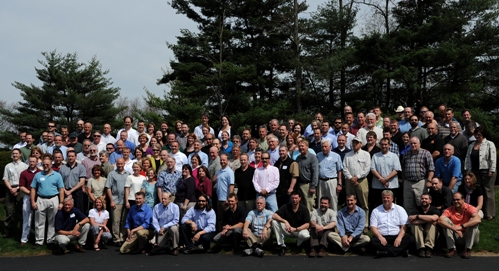
As I previously noted, I spoke yesterday (7 April) to the annual gathering of PA DCNR state park managers and staff in State College. This group photo is from that gathering, one that I copped while the official photographer staged the group. Take a good look at these folks. They manage the best state park system in the nation, according to the national gold medal award they received a few months ago from the American Academy for Park and Recreation Administration in partnership with the National Recreation and Park Association. For their great work they received a budget cut from the PA legislature. Congratulations.
The recent economic blowup has shown precisely what is and what is not sustainable economic development. In my opinion, the first tenant of sustainable development should be to keep people gainfully employed, followed closely by protecting and enhancing people’s quality of life. Remember that curious phrase in the Declaration of Independence (4 July 1776): “life, liberty, and the pursuit of happiness?” Remember that the Declaration stated, unequivocally, that these rights were “unalienable?” In case that slipped by you in that 7th grade American history class, here is the phrase in its entirety:
We hold these Truths to be self-evident, that all Men are created equal, that they are endowed by their Creator with certain unalienable Rights, that among these are Life, Liberty and the pursuit of Happiness.
Apparently this concept appeared earlier in the Virginia Declaration of Indepdendence (12 June 1776), which stated the following:
What all men are by nature equally free and independent, and have certain inherent rights, of which, when they enter into a state of society, they cannot, by any compact, deprive or divest their posterity; namely, the enjoyment of life and liberty, with the means of acquiring and possessing property, and pursuing and obtaining happiness and safety.
Please notice the reference to the inherent right to acquire and possess property in the Virginia version. Franklin and Jefferson thought that they should tone that down somewhat for the U.S. declaration, since slaves where considered property at that time as well as land. In other words (big surprise), in Virginia they declared that men (and they meant men) had the inherent right to the “enjoyment of life and liberty, with the means of acquiring and possessing property….” Virginians declared their inherent right to own slaves, in other words (or, at least, in my words).
Let’s get back to my original reference, to that curious “life, liberty, and the pursuit of happiness.” I understand “life.” I understand “liberty.” But doesn’t “pursuit of happiness” sound a bit queer? Perhaps, but doesn’t “quality of life” sound equally odd? Life and liberty are immutable, black and white. Happiness is soft, squishy, like “quality of life.” But don’t we all know when we are alive, when we are free, and when we are happy? Are the three unalienable rights all that different?
Parks and open spaces have always been part of this “happiness” component. But let’s first consider the other two. Originally the open lands of the U.S. provided natural resources, food, water, and inhabitable space for the growing American population. The overcrowded European landscape is one reason so many immigrants risked the voyage. As American’s began to sprawl, the need to conserve and protect lands for their natural resources, game and wildlife, and water became apparent. Thank you, Teddy Roosevelt and Gifford Pinchot, among others. These public lands, to this day, provide critical protection for resources such as wildlife, timber, gas (such as Marcellus Shale), and water. They give us life.
I would argue that the public lands, as the most perfect expression of the American democracy, also give us liberty. Within a public park, we are all equal. We did not create private game parks such as in Europe, open only to the aristocracy. In the state of Pennsylvania, anyone can enter a state park and enjoy their public lands at no charge. There are free, as in liberty.
These people gathered in the photo above shoulder the responsibility of protecting these public lands for future generations. They also offer the broadest selection of recreational opportunities feasible given budget constraints and carrying capacities of individual parks. Yet they are rarely thanked for their dedication, for their commitment. Like so many public servants, they are seen by many as the complaint desk.
I, for one, thank them for their hard work and sacrifice. Pennsylvania is the birthplace of some of the earliest concepts of parks, public lands, and conservation. Pennsylvania, in my mind, is the cradle of conservation. This is the DCNR heritage, and I believe that the agency and its personnel take their charge seriously.
Thanks.
Ted Eubanks
8 April 2010